Rational and Irrational Numbers Exploration Activity
This blog post contains Amazon affiliate links. As an Amazon Associate, I earn a small commission from qualifying purchases.
This is a picture of a foldable that I created for my students to use as they walked through a rational and irrational numbers exploration activity. This activity did not go as planned. I thought it would take one class period. After one class period, we had only started to scratch the surface. I ended up never finishing this activity with my students because I felt a need to move on.
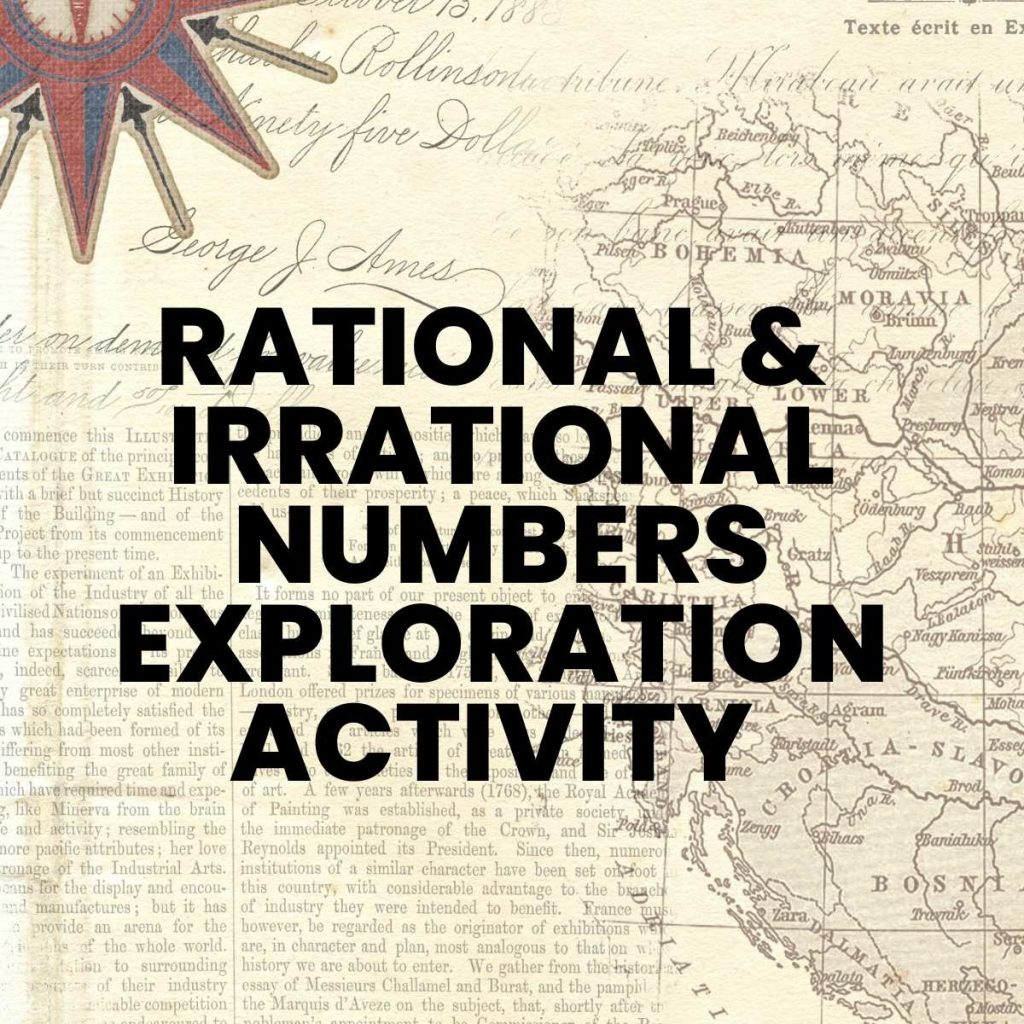
Still, I want to share this activity with you in the hopes that someone might be inspired to take this and make it better or at least give me insight on why it didn’t quite work.
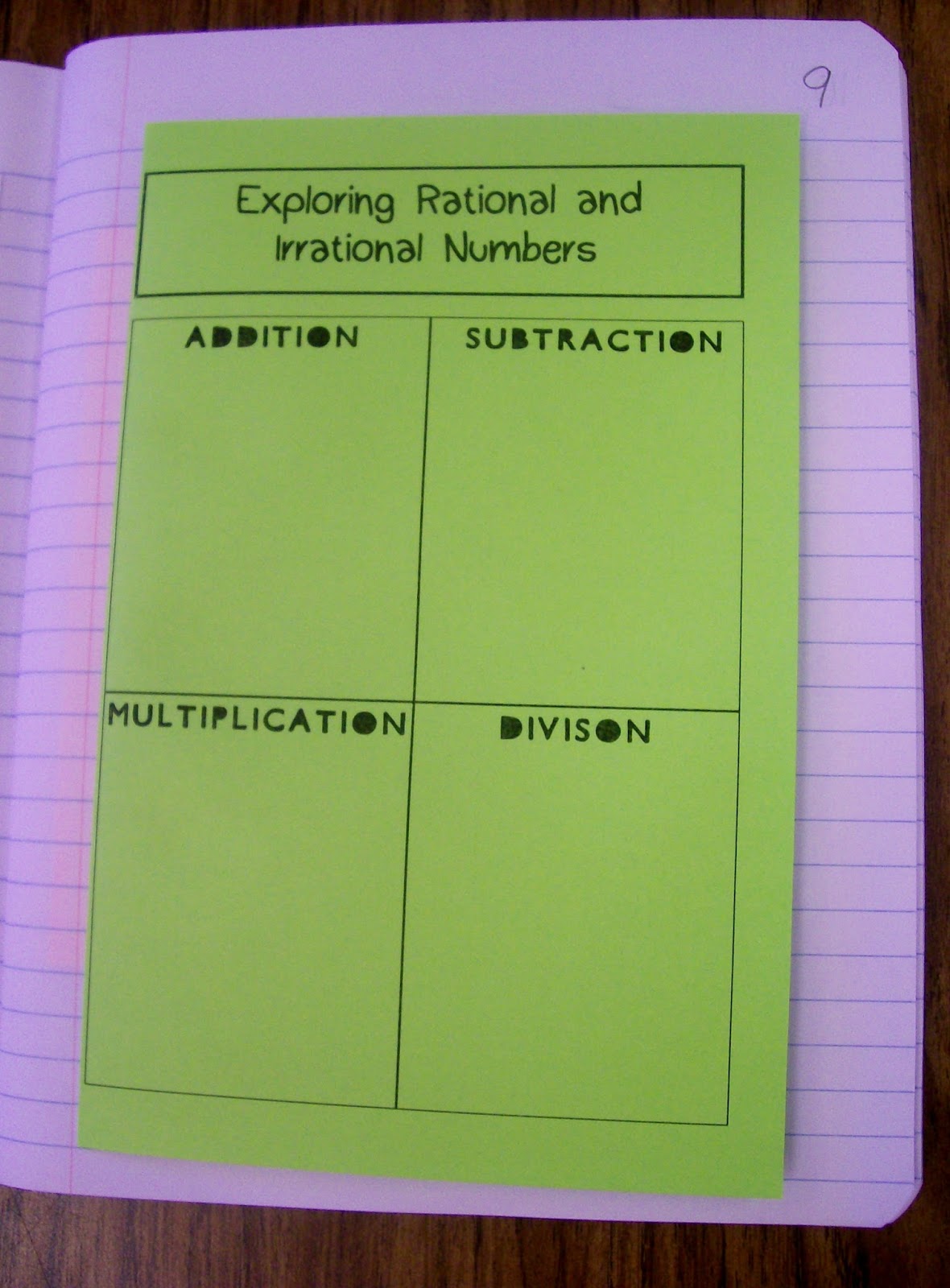
This activity was created with N-RN.3 in mind.
Explain why the sum or product of two rational numbers is rational; that the sum of a rational number and an irrational number is irrational; and that the product of a nonzero rational number and an irrational number is irrational.
I had some blank sticker name badges in my desk. So, I took a Sharpie and wrote various rational and irrational numbers on each name badge. As students came in the classroom, they got to pick a random number from the pile.
After a brief introduction to the TI-30 Scientific Calculator, students were instructed to partner up and fill out the first line of this chart. They would fill in their number, the classification of their number (rational or irrational), their partner’s number, their partner’s number’s classification, and the operation of addition.
Using the scientific calculator, students would add the two numbers together, record the result, and then determine whether the result was rational or irrational. Find a new partner. Repeat until the first five lines have been filled in.
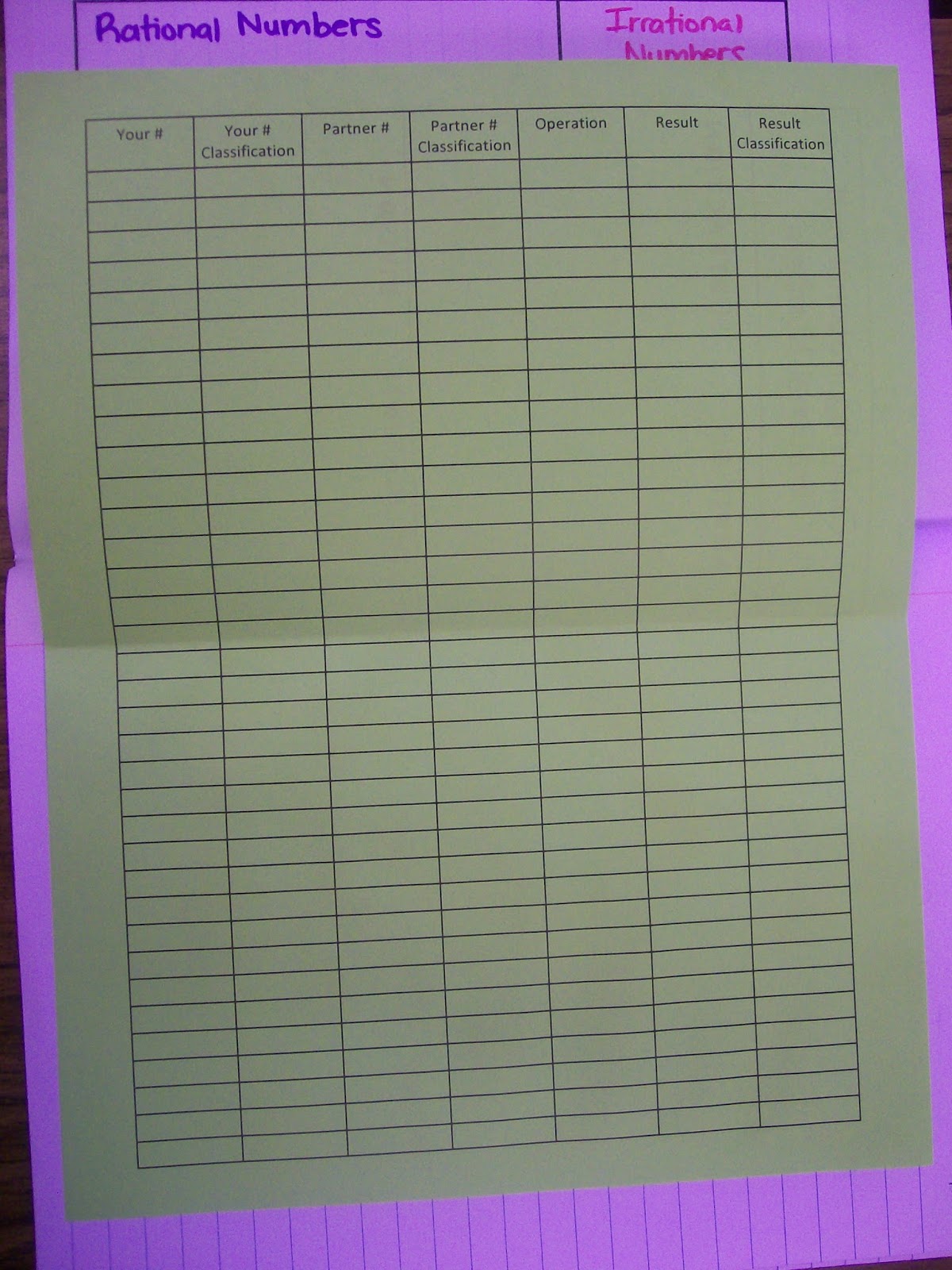
After completing five addition operations, we would have a class discussion. I was hoping that students would arrive at the fact (on their own) that a rational plus a rational is always rational, an irrational plus a rational is always irrational, etc. This went semi-well. Some of my classes struggled with this way more than others. None of my classes made it to division. One class barely made it through subtraction.
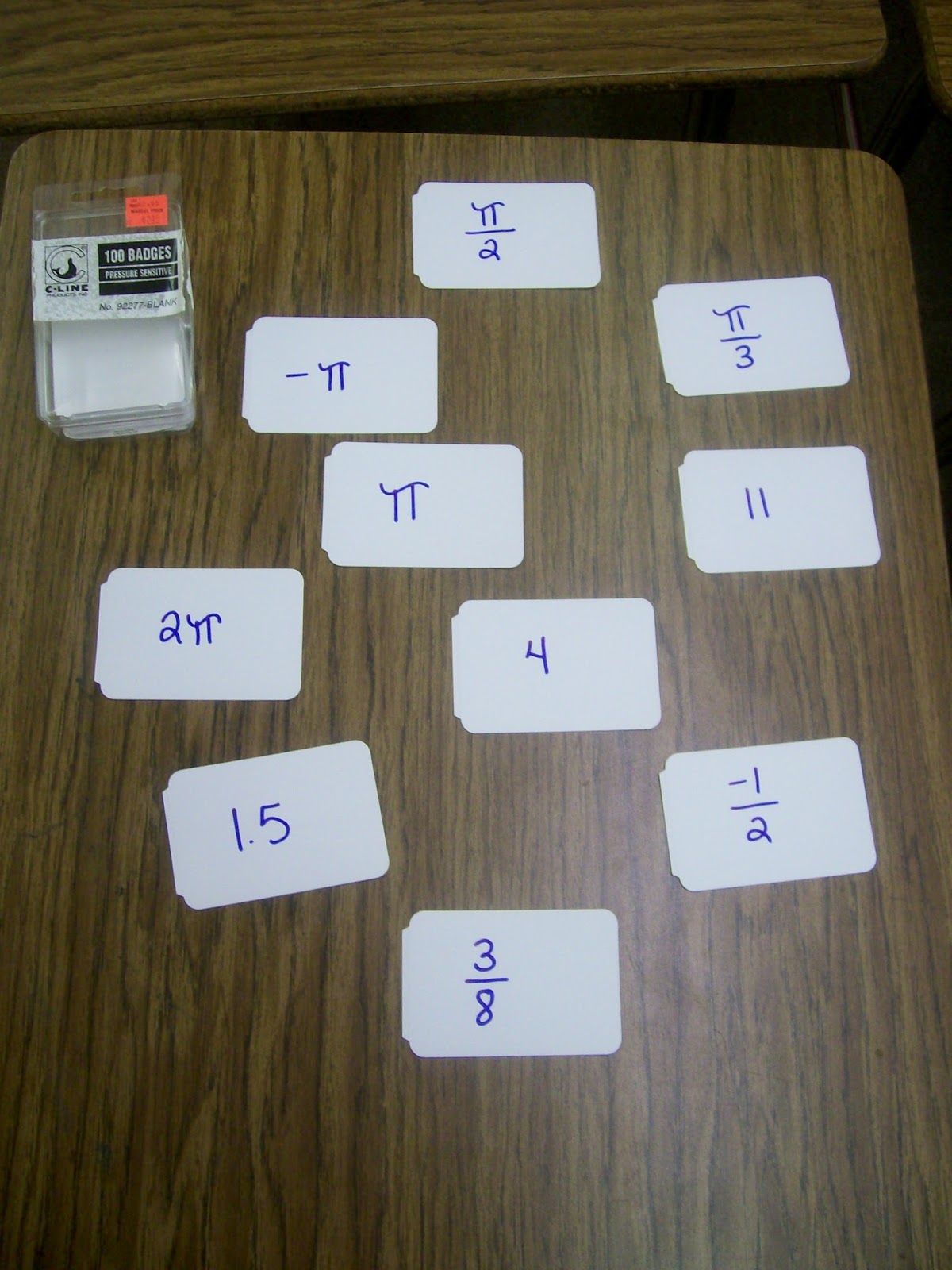
What I didn’t account for was the sheer amount of time that it took for my students to partner up, do the calculations, and fill out this chart. This ended up feeling like an entire waste of a class period because it was a lot of work with very little to show for it. I ended up doing most of the talking and discovering during our discovery period which was frustrating.
We wrote our “discoveries” on the front of the foldable.
I still want to put this idea out there, though. I think it’s good to blog about the lessons that go well, the lessons that are just mediocre, and the lessons that don’t go as planned.
And, yes, I’m the crazy teacher who wore a sticker around ALL DAY that read 3/8. I put it on during first hour because I had an odd number of students. So, I actually went through the activity with my students. I didn’t take off my sticker because I figured I would just have to make another one to wear for third hour and sixth hour. Third hour, we had a fire drill.
Of course, I got asked by everyone I saw why I was wearing a number on my shirt. The math teacher definitely came out in my answer as I explained that I wasn’t just wearing any number, but a rational number. Conversation ensued about what a rational number was. Yes, I’m that teacher who takes every opportunity possible to teach my kiddos something mathematical!
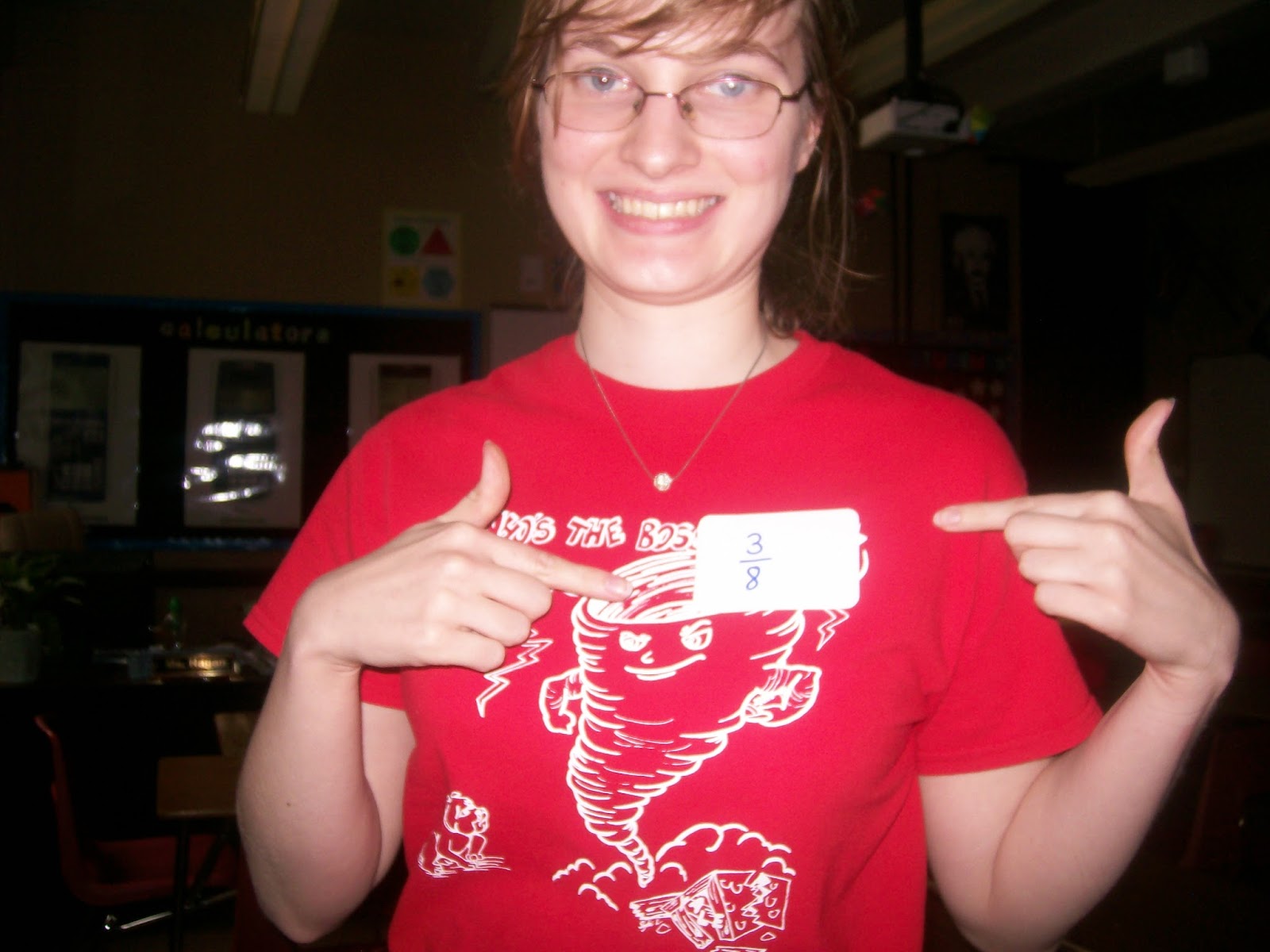
Later that morning, we had our tornado drill. As the students huddled in the stairwell, the teachers stood in the hall. The history teacher looked at me and said, “So, you’re less than half?” Confused, I asked her to repeat the question. “So, you’re less than half?” Still confused, I decided that I would just agree with the history teacher and go on down the road even though I had no idea what she was talking about. Luckily, she motioned toward my sticker, and I realized that she was referring to the fraction I was proudly wearing. The other teachers in my building are used to my crazy methods that I use to teach math by now, so they weren’t that surprised.
What did surprise me was my statistics students. I have a class of 5 juniors who are taking statistics as their upper level math elective. Statistics is the only class that we offer our students above Algebra 2. These are our best and brightest math students who have chosen to take their math class at our school instead of our local Career Tech center.
Of course, they had to ask about my lovely sticker that I was wearing. I explained why I was wearing it, and I told them about all the crazy conversations I had had that morning as a result. What do my students decide to do? They decide that they want to make their own stickers with numbers on them to wear around the school for the rest of the day. There are kids who love math, and I’m so thankful that I get the chance to teach them!

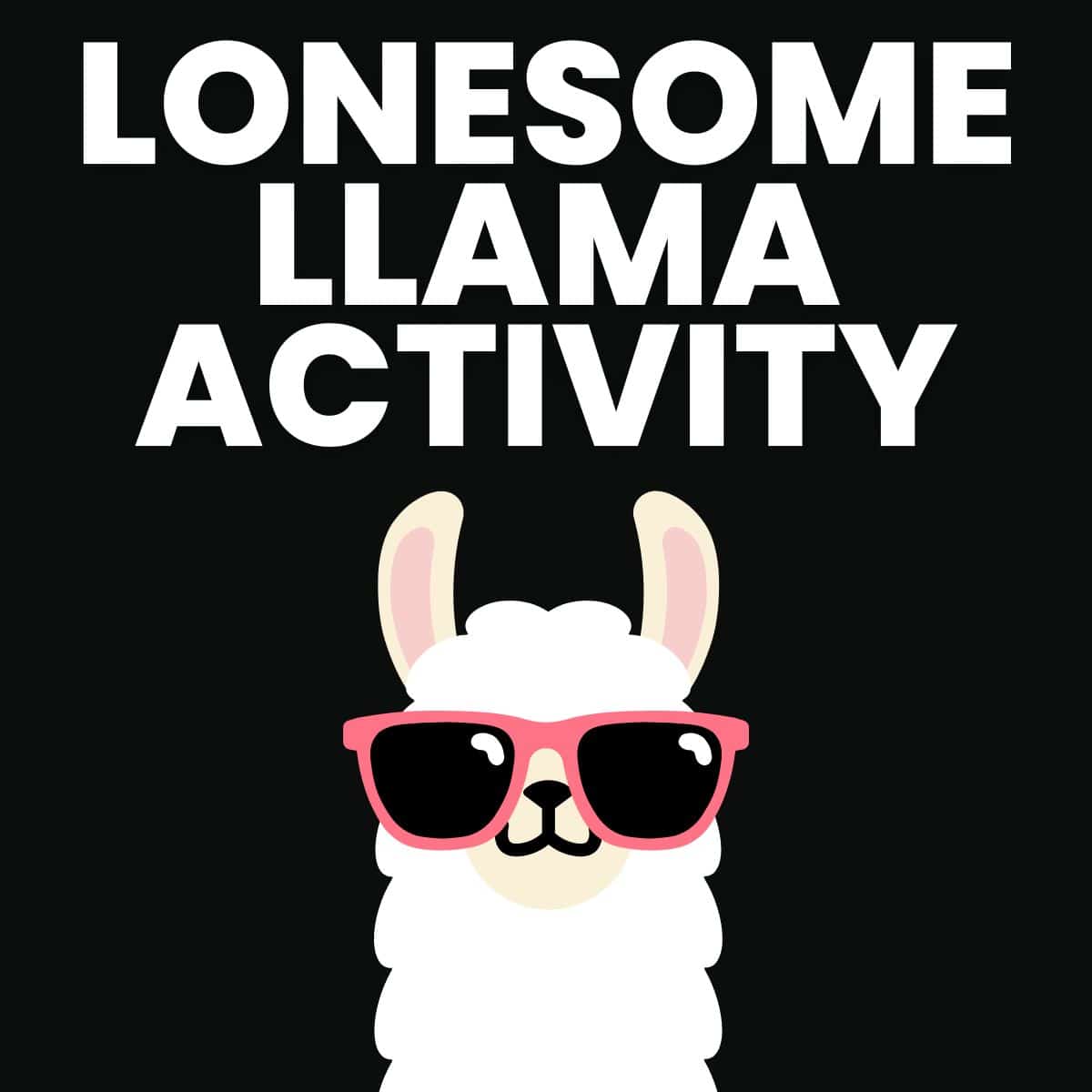
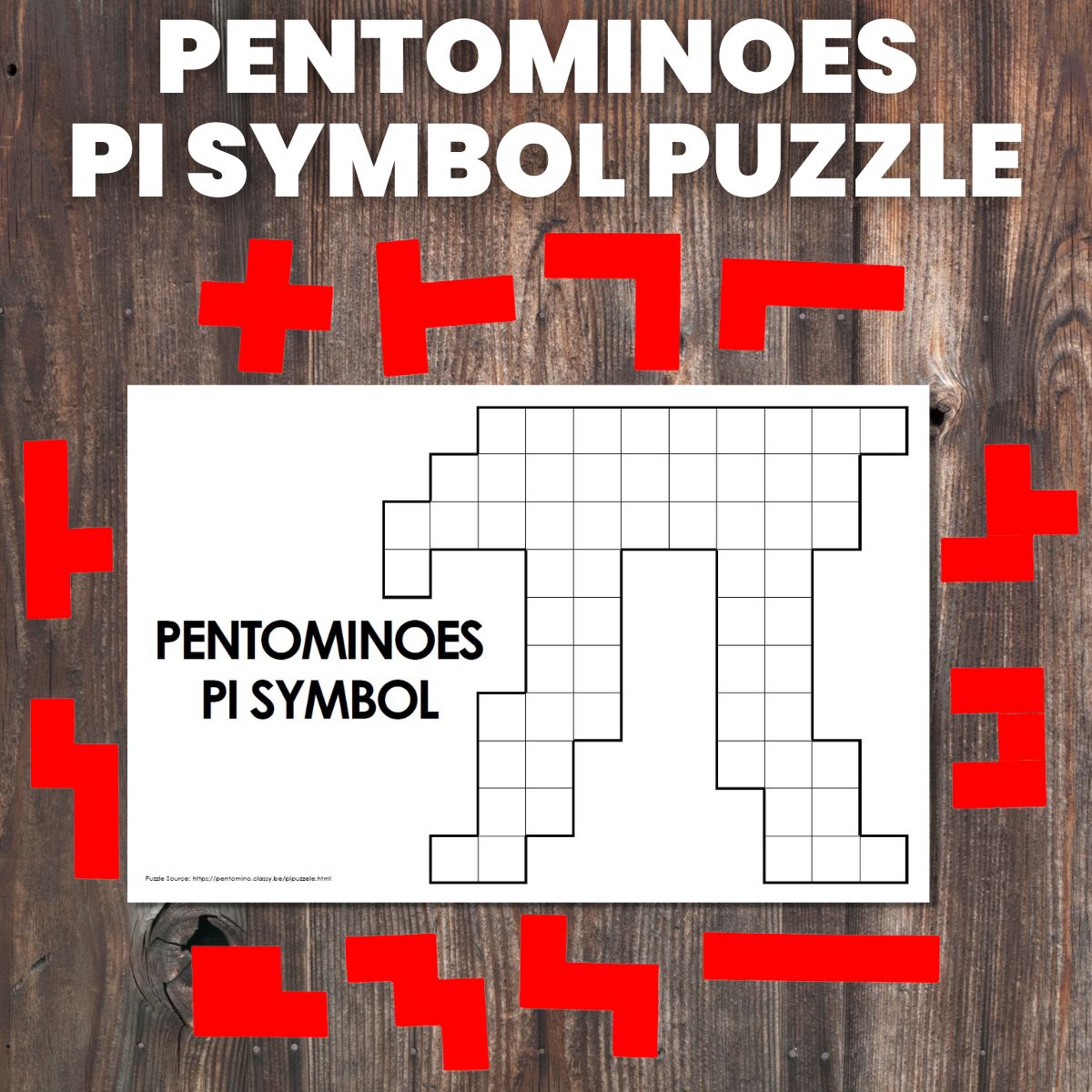
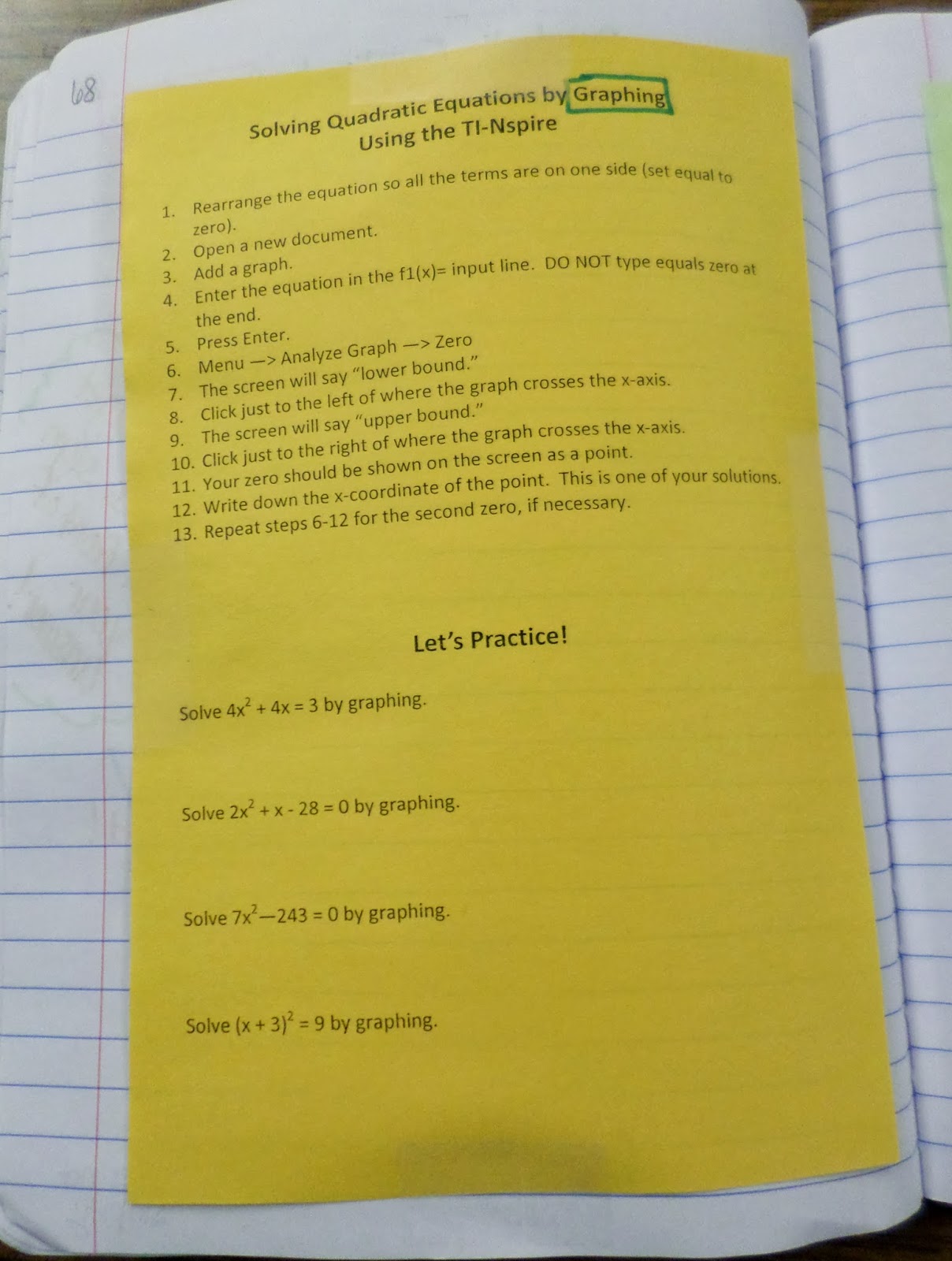
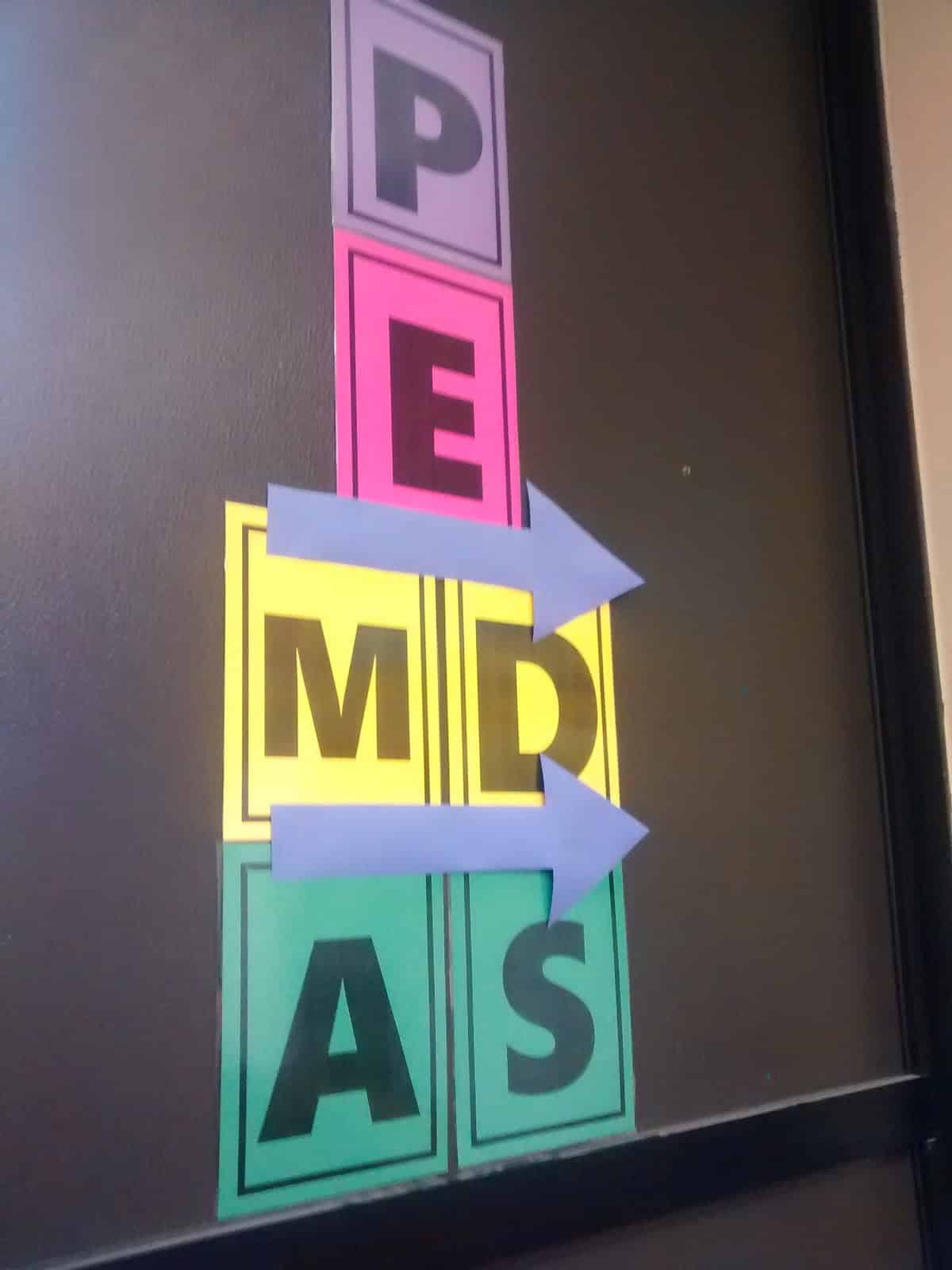
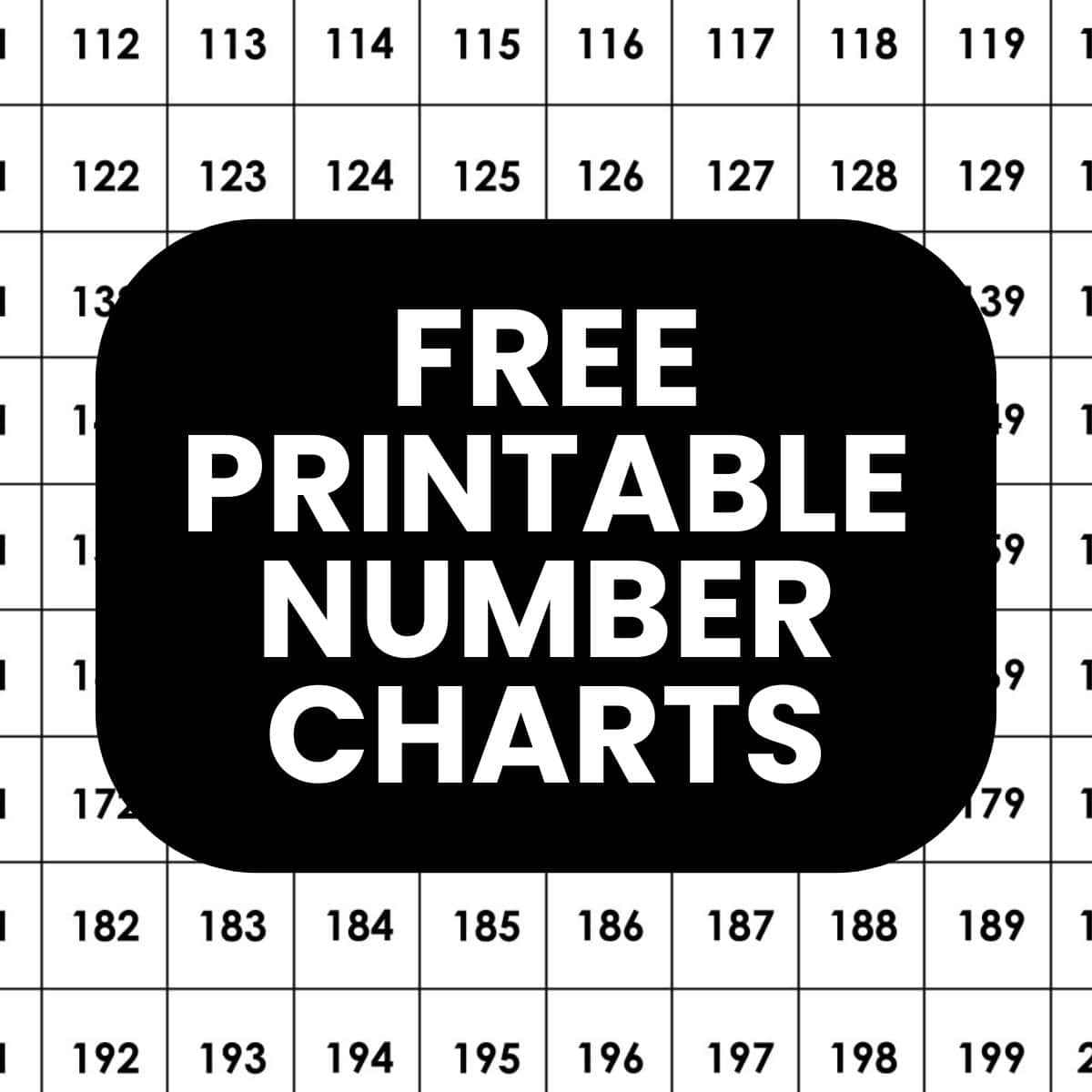
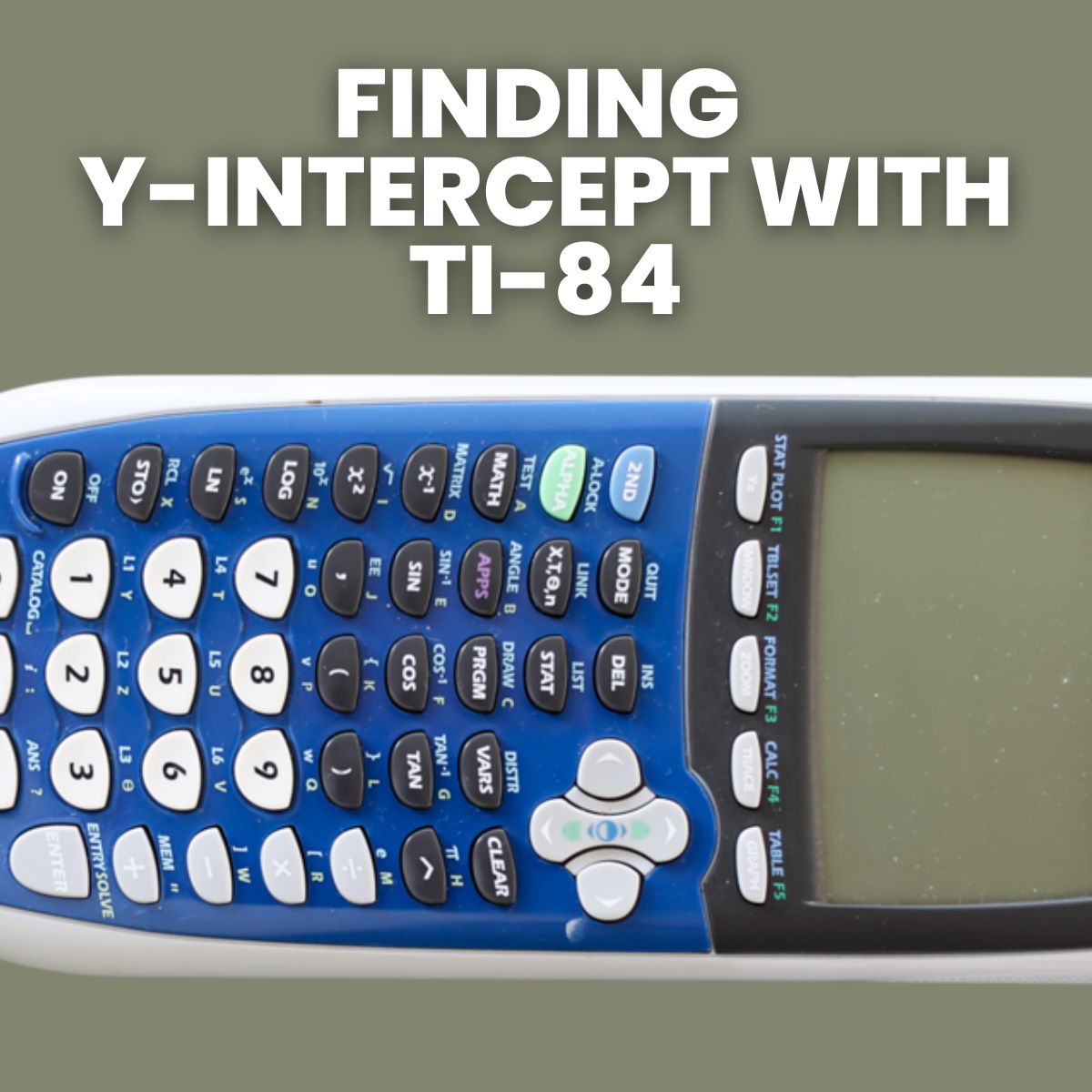
I love to see what you did with your students! Mine are only 6th graders, but I do similar things. I am definitely passing this on to my Algebra teacher.
Oh, and your unit table of contents… I showed that to a science teacher and she feel IN LOVE with it. I will definitely share the download.
THANK YOU!
Elizabeth
Hodges Herald
Love, love, love that your statistics students want to wear number name tags too!
Thank you for sharing your work. I have been teaching for over 10 years and I have started to burn out, but your site has re-energized me and I'm so excited for this school year. This year I am teaching 9th graders Algebra I, I haven't taught 9th grade in over 6 years. You have provided me with so much insight especially with CCLS. I will be using INS this year!!! All the best to you for the new year. Peace & blessings!!!
Thanks for sharing your lessons/templates. I'm always looking for inspiration for notebooks and its cool to see what you do and also how you incorporate Journal Wizard's stuff into your lessons.
Thanks!
I have found so many useful activities and foldables on your blog site so thank you. I am interested in putting together interactive notebooks for my middle school students. My questions to you are: How do you introduce these to your students at the beginning of the year? AND What goes on the first three pages of your INB? Your blog only shows starting with page 4. Thank you!!!
Hi Carri, that's an awesome question. The first page of my INB is dedicated to my students' names. I make them put their name on the first page. And, I ask them to make sure it has the name of their class and class period somewhere on the page as well. Then, I have students decorate the page in a way that tells me something about them. This is one of our first assignments of the year.
Page 2, this year, was reserved for a concept map over Unit 1. At the end of Unit 1, I asked students to synthesize everything we learned in Unit 1 into a single concept map. Page 3, this year, was a table of contents page for Unit 1.
I had grand plans this summer to have students do lots of cool pages that would go at the front of their interactive notebooks before the table of contents. But, I ran out of time, and I decided it was best to just jump right into Unit 1.
Last year, I had students glue in their syllabus at the front of the notebook. I have seen other teachers include things like learning style surveys, personality tests, formula sheets, partner grouping scenarios like clock partners, and so much more. The possibilities are endless. Hope this helps!
And, thank you so much for reading my blog! I think your middle school students are going to love the interactive notebooks. I don't use textbooks with my students, so I introduce the interactive notebooks at the beginning of the year as a textbook that we are going to create over the course of the school year. We walk through setting it up together as a class.
I'm new to INB but LOVE your ideas! How many notebooks do you go through in a year? It seems like one composition book isn't enough space. Where do they do their homework? Do you find composition books better than spiral?
In two years, I've never gone through more than half of one composition notebook. Of course, I do not have my students do their homework in the notebooks. If they did, we would use many more pages. We don't have textbooks, so all of my homework assignments are worksheets. I'm rethinking this for next year, though.
Spiral notebooks work great if you get a new notebook at the semester. If kids try to use a single spiral for the whole year, the covers will rip off, and it's not pretty. All of my students who chose to use a spiral this year regretted it by around February. My kids with the composition notebooks have had no trouble at all.
I either print my worksheets half size or have the student fold the worksheet and glue it at the margin
I am really going to try this! Thank you for sharing your ideas.
How did it go? Thanks for reading my blog.
Hi, if this was asked before and answered just reference it, but when I had a brief pd on interactive notebooks, the notebooks were to stay in the classroom. Also, the left side was what I have then and the right side was how they interpreted the info I gave them. Granted, one can do the notebook anyway they wish and I was shown this at an elementary school. My real question is, do you allow you students to take them home? And if not, what do they use to study. Fourth year intervention specialist, first year teaching algebra 1, life long math enthusiast 🙂
Hi, if this was asked before and answered just reference it, but when I had a brief pd on interactive notebooks, the notebooks were to stay in the classroom. Also, the left side was what I have then and the right side was how they interpreted the info I gave them. Granted, one can do the notebook anyway they wish and I was shown this at an elementary school. My real question is, do you allow you students to take them home? And if not, what do they use to study. Fourth year intervention specialist, first year teaching algebra 1, life long math enthusiast 🙂
Hi
I've been downloading your stuff like crazy, i think I can use a lot of it with my grade 9 math group. They HATE writing regular notes, and never seem to reference them anyway, so I think this will help. I have a quick question. I love your BEDMAS/PEDMAS organizer as shown in your picture above, but the one I downloaded has a foldable part at the top, but I'm not sure how you'd use that – could you post a picture or explain what you put in each section? Just a description in words of each step of BEDMAS? Thanks!
We did a sample problem underneath. First flap showed parentheses, second flap exponents, etc.
It's my first year teaching, and I'm so excited I found your blog!! I've been snatching up ideas left and right, so thank you for sharing! We just finished our first week of school, and on the last day of the week we began setting up our INBs. I assume that your students have their notebooks on the first day of school, but since I was hired 4 weeks before school starting I wasn't able to add this to our school supply list. Do you have any suggestions on how to incorporate material we've already covered into the notebooks without taking too much time away from lessons?
Maybe just type up a few summary sheets for students to glue/tape in? We start our notebooks on Day 3. That gives students the weekend to get a notebook.
Hope you have a great first year!
You are my new favorite teacher blogger!!! I teach 7th, 8th & Honors Algebra. I'm trying the INB for the first time this year… Please help! I can't get the files. If you can email them I'd soooooooo appreciate it! Any and EVERYTHING you send is greatly appreciated! You rock!!! Msjamesteacher[at]gmail.com
E-mail sent!
Hi Sara, I have been enjoying your blogs for the past year and think that you are a wonderful and honest teacher. I teach Algebra I and have been somewhat traditional in my teaching. I really want to try to do Interactive Notebooks with my students this year. Do you complete an INB of your own before you present it to the students? I'm somewhat nervous, but want to give it a try. I also could not get the files. Could you email them to jedmonds@hopewell.k12.va.us ??? I really appreciate you sharing your material and teaching strategies. Pray for me. 🙂
Hey, I love this activity! I did something similar to lead into properties of real numbers.
I did "speed dating" and at each spot they had to answer 8 questions (2 minutes was more than enough time, even without a calculator.)
Here's the setup.
|my#|+|their#|=|Answer| then |their#|+|my#|=|Answer|
we did this for all four operations. Each student did 70+ questions, depending on how many students were in the class. I gave out "hello my name is" name tags from -12 to 12. The students loved it and it is a great way for them to see patterns.
Some of your files do not show on my browser 🙁
Will you please email your INB files for Algebra I and Geometry (if you have any!)
Thank you!
jacque0716[at]gmail.com
Some of your files do not show on my browser.
Will you please email me your files for Algebra I and Geometry.
Thank you!
lprocks05[at]gmail.com
Hi! I realize I'm coming to this late, but this will be my first year teaching Algebra in public school and I am finding your stuff really helpful. I like the idea of each unit having its own table of contents, rather than a long list at the beginning of the notebook…especially if it's combined with tabs for the start of each unit. Do you have a file of your table of contents page that you would be willing to share? Thank you!